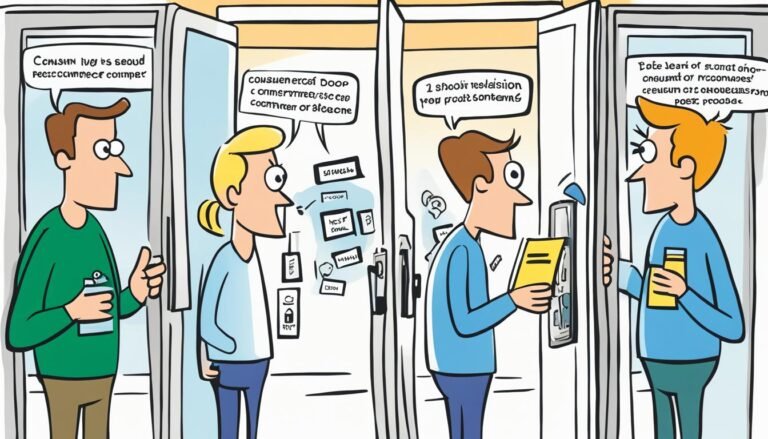AI in Sales: The Future of Sales Automation
Are you ready to explore the power of artificial intelligence (AI) in your sales team? The sales world is changing fast, and AI tools are becoming key to success. They help make processes smoother, improve customer experiences, and give businesses an edge. Let’s explore how AI can change your sales team’s work for the better.
Key Takeaways
- High-performing sales organizations are 1.9 times more likely to be using AI already than underperformers.
- Research suggests that a fifth of current sales-team functions could be automated, allowing sales teams to focus more on strategic tasks.
- AI automation can free up about 46% of employees’ time by handling tasks.
- AI-driven chatbots can enhance customer service, reducing response times by 80%.
- AI can boost sales productivity by 5-10% and increase sales by up to 50%.
The Rise of AI in Sales
The sales world is changing fast, thanks to artificial intelligence (AI). AI is making sales teams work smarter, not harder. It automates boring tasks and gives insights to boost productivity and efficiency.
What is AI Sales Automation?
AI sales automation means using AI in sales tasks. It uses machine learning to study customer data and guess how likely they are to buy. Conversational AI assistants talk to customers all day, every day. And natural language processing helps with making content and checking call transcripts.
How AI is Transforming the Sales Landscape
- AI looks at lots of data to find trends and guess what customers will do next. This helps sales teams make strategies that really speak to customers.
- Tools like Salesforce Einstein and HubSpot Sales Hub use AI for predictive lead scoring and automating sales. This makes the sales process smoother.
- AI tools like Chorus.ai and Gong.io listen to sales calls to give insights and track how deals are going. This helps sales teams make smart choices.
- Predictive analytics with AI can forecast what customers will do and what trends will happen. This leads to smarter sales strategies.
- AI automates simple tasks like entering data, sending emails, and setting meetings. This means sales teams can do more and make fewer mistakes.
AI is changing sales by automating simple tasks and giving insights. This lets sales teams focus on building strong customer relationships. It also boosts machine learning sales and predictive sales analytics.
“The adoption of AI in sales technology is on the rise as businesses acknowledge its potential to drive revenue growth and operational efficiency.”
Enhancing Customer Experiences with AI
AI is changing how we talk to customers in sales, making interactions more personal and caring. It helps sales teams understand how customers feel by analyzing their words. This lets them respond in a way that really connects with people.
Sentiment Analysis for Personalized Interactions
AI uses sentiment analysis to figure out how customers feel. It looks at the words and tone customers use. This way, sales teams can change how they talk to match what customers need.
This makes customers feel heard and valued. It helps build stronger relationships and makes customers happier.
AI-Powered Lead Scoring and Prioritization
AI also changes how we find and focus on leads. It looks at customer data to find the best prospects. This means sales teams can spend their time on leads that are most likely to buy.
This intelligent lead scoring from AI-driven customer engagement makes sales more efficient. It helps teams get better results.
“Hyper-personalized customer experiences are expected to be delivered through Voice AI by leveraging customer data and AI-powered insights.”
AI is making buying easier and more enjoyable. It uses AI to give customers what they want: personal, caring, and smart interactions.
AI in Sales: The Future of Sales Automation
The world of sales is changing fast, thanks to AI. AI can do routine tasks and give insights from data. But, we still need humans for trust, understanding customers, and offering custom solutions. The future of sales will blend AI and human skills for a better sales experience.
The Evolving Role of Human Salespeople
AI is taking over some sales tasks like prospecting and data entry. Now, human salespeople focus on deeper tasks like analyzing customers and building strong client relationships. They need to be good at people skills, empathy, and adding value with their insights.
Balancing Technology and Human Connection
Getting the right mix of tech and human touch is key for sales automation’s future. AI-powered sales coaching helps sales reps do better and connect more effectively. Yet, keeping a human focus is vital for trust and meeting customer needs. Training programs now focus on both tech skills and people skills for better sales.
As the future of sales automation moves forward, AI and human skills will work together more. This will lead to more efficient, personalized, and satisfying sales. Sales teams that use this mix well will do well in a tough market.
“The future of sales lies in the strategic integration of AI and human expertise, leveraging the strengths of both to create a more efficient and personalized sales experience.”
AI-Driven Productivity Gains
Using artificial intelligence (AI) can greatly improve how sales teams work. AI helps automate tasks that take up a lot of time, letting sales reps focus on important work. These tools use machine learning to look through big datasets and find the best opportunities. This leads to better lead scoring and forecasting.
Automating Repetitive Tasks
AI can handle many routine sales tasks, like checking leads, entering data, and making reports. This means sales reps can spend more time on important tasks, like selling, talking to customers, and closing deals. AI also helps with making content, sending emails, and transcribing calls.
Data-Driven Lead Scoring
AI helps score leads by looking at customer data to find the best prospects. This helps sales teams use their time well. The algorithms use past data, customer behavior, and market trends to spot leads that are likely to buy. This way, sales reps focus on the best leads, which helps sales grow.
By using AI, sales teams can do more and close more deals without hiring more people. Adding these smart technologies to sales work lets businesses grow, work better, and give great customer service.
“AI can automate time-consuming tasks in sales, freeing up reps to focus on revenue-generating activities.”
Overcoming Sales Challenges with AI
AI-powered sales automation is changing the game in sales. It helps tackle common sales hurdles. One big issue is inconsistent CRM data. This can make it hard to target and personalize to customers. But, AI can fix these data problems, giving a full view of each customer.
Another big challenge is lost upsell opportunities. Sales teams often miss the best chances to sell more products. AI looks at what customers buy and like. It suggests the best upsells and cross-sells, helping to increase sales.
The problem of marketing-sales alignment still exists in many companies. AI can help by scoring and qualifying leads. This makes sure only the best leads go to sales, making the sales process better and boosting smart sales enablement.
“AI-driven sales automation has the power to transform the way we approach common sales challenges, from inconsistent CRM data to missed upsell opportunities and marketing-sales misalignment.”
Using AI, sales teams can beat these challenges and do better. The future of sales is about combining human skills with AI. This leads to a smoother and more successful sales process.
Conclusion
AI is changing how businesses talk to customers and grow. It automates tasks, improves customer experiences, and gives insights. This leads to more productivity, efficiency, and making more money. As sales roles change, the best companies will use tech and human skills together.
This mix makes sales more personal, quick, and successful. AI in sales is growing fast, helping with finding leads, understanding customers, and reaching out to them directly. As AI gets better, we’ll see even more improvements in efficiency, forecasting, and knowing what customers want.
Using AI, sales teams can spend more time on important tasks. They can make better decisions with machine learning. This leads to better business results.
AI in sales isn’t about replacing people. It’s about making them better and helping them give a smoother, more personal, and effective sales experience. By using tech and human skills together, companies can stay ahead in a tough market.
Source Links
- AI Agent Examples: Revolutionizing Sales Automation and Forecasting | Relevance AI
- Revolutionizing Industry: Discover How AI is Changing Industrial Sales!
- The Rise of AI Sales Tools: Transforming the Sales Landscape – Sales Closer AI
- The Rise of AI in Sales Technology
- Voice AI and the Future of Sales Automation
- Will Sales Be Replaced by AI? Exploring the Future of Sales Automation
- Sales AI: Artificial Intelligence in Sales is the Future | Dialpad
- How AI Shapes the Future of Sales | Deliberate Directions
- Sales AI: The Future of Artificial Intelligence in Sales
- Sales AI: How Artificial Intelligence is Shaping the Future of Sales
- How AI in Sales Automation Can Transform Sales
- Revolutionizing Sales with AI: From Challenges to Triumph 🚀
- The Future of Sales AI
- Exploring the Transformative Benefits of AI in Sales
- AI’s Impact: Revolutionizing Sales Automation in Business







